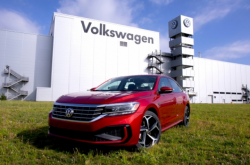
— A VW emissions class action lawsuit has been dismissed after former owners and lessees argued they should be compensated even though they sold their vehicles or ended their leases before September 18, 2015.
That's the date when the public learned Volkswagen had been selling illegal diesel vehicles in the U.S. since 2009.
Those nearly 500,000 Audi and VW "clean diesel" vehicles were equipped with emissions defeat devices installed to fool consumers and regulators.
The vehicles were advertised as good for the environment and fuel efficient, when in fact defeat devices were used to evade federal and state regulations. The diesel vehicles emitted legal levels of nitrogen oxides when undergoing testing, but during normal driving the vehicles emitted nitrogen oxides (NOx) up to 40 times over legal limits.
Current owners and lessees eventually were awarded buyback offers and compensation, but former owners and lessees complain they should also be compensated.
VW's Motion to Dismiss the Emissions Class Action Lawsuit
The class action lawsuit had already been partly dismissed, and even with the remaining claims the judge said it “may be challenging for Plaintiffs to prove the amount that they paid specifically for low emissions."
Judge Charles R. Breyer also previously found "it is doubtful that Plaintiffs’ overpayment would have been equivalent to the entire cost of the package if the package also included features that Plaintiffs received” like strong fuel economy and better driving performance.
Volkswagen argued the plaintiffs had the burden of showing they were injured despite the inflated resale and residual value of their diesel vehicles. And VW said the plaintiffs failed because their experts “did not measure any emissions premium or calculate whether and by how much it depreciated.”
The motion to dismiss also argued the expert evidence submitted by the plaintiffs was unreliable.
VW said the depreciation analysis offered by the plaintiffs assumed without support that a "vehicle’s overall rate of depreciation can be applied to measure the depreciation of the alleged emissions premium."
The automaker also told the judge empirical evidence shows diesel vehicles generally depreciate more slowly than gasoline vehicles. And "diesel-specific attributes (such as the level of NOx emissions) depreciate differently, and may not depreciate at all."
According to the judge:
"Without a reliably calculated emissions premium, Plaintiffs’ depreciation analysis is useless because it lacks a starting point from which to calculate a decline in value for low emissions. Plaintiffs assume that the value of an emissions premium declines at the same rate as the overall vehicle. That is plainly wrong."
VW said the plaintiffs didn't suffer any damages at all because they sold their vehicles or ended their leases before VW's fraud was known.
The judge went on to use a purse as an analogy.
"Consider a counterfeit Louis Vuitton purse, sold as authentic for $1,000 and later resold as authentic for $800. Was the first purchaser harmed? Maybe. If a known inauthentic purse would have cost $100 and resold for $80, then the first purchaser would have recouped all but $20, instead of all but $200, upon resale."
The judge said in that case the first purchaser was injured for $180.
"If the first purchaser could provide evidence of the authentic and counterfeit purses’ relative depreciation, the first purchaser could prove an injury. Note that the first purchaser’s initial overpayment of $900 is plainly larger than any injury—were the first purchaser awarded $900 after reselling the purse for $800, the first purchaser would get a significant windfall."
However, the judge said the subject of the lawsuit is more complicated.
"Authenticity is a single variable that the first purse buyer did not receive and later did not give. But here, Plaintiffs paid a premium for some features they did receive (better fuel economy and driving performance) and another feature they did not (low emissions). This makes the low emissions premium and its depreciation more difficult to isolate and measure."
Judge Breyer granted VW's motion to exclude the expert evidence submitted by the plaintiffs, denied a motion from the plaintiffs to exclude VW's expert evidence and dismissed the entire lawsuit for a lack of jurisdiction.
The Volkswagen emissions class action lawsuit was filed in the U.S. District Court for the Northern District of California - In Re: Volkswagen "Clean Diesel" Marketing, Sales Practices and Products Liability Litigation.
The plaintiffs are represented by Hagens Berman Sobol Shapiro LLP, and the Paynter Law Firm, PLLC.




